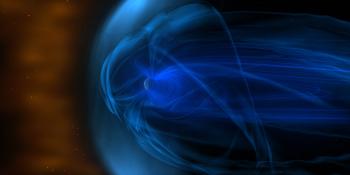Visualizzazione archivio di venerdì, 13 luglio AM
Rapporto attività solare
Ogni brillamento solare menzionato nel rapporto ha un fattore di scala, applicato dal Centro di Predizione Meteorologica Spaziale (SWPC). A causa del fattore di scala del SWPC, i brillamenti solari sono segnalati come ridotti del 42%, rispetto ai dati di qualità scientifica. Il fattore di scala è stato rimosso dai nostri dati archiviati sui brillamenti solari, per riflettere le unità fisiche reali.
Rapporto dell'Attività Geofisica Solare 2012 Jul 13 2200 UTCPreparati dal SWPC della NOAA© ed elaborati da SpaceWeatherLive.com
Rapporto Congiunto USAF/NOAA dell'Attività Solare e Geofisica
SDF Numero 195 Emesso alle 2200Z il Jul 13 2012IA. Analisi delle Regioni Solari Attive e Attività dalle 2100Z-12 alle 2100Z-13 Solar activity has been at low levels for the past 24
hours. Region 1521 (S21W34) has been the most active region,
producing multiple low-level C-class events. Region 1520 (S16W23)
has decayed in area but remains the most magnetically complex region
on the disk, still classified as a beta-gamma-delta. The other four
numbered active sunspot regions have remained quiet and rather
stable. A CME was observed in LASCO C2 imagery at 13/0224Z. After
analysis, the CME was determined to not be geoeffective.
IB. Previsione dell'Attività Solare
Solar activity is expected to be at
low to moderate levels for the next three days (14-16 July), as
Regions 1520 and 1521 continue to evolve and rotate toward the west
limb.
IIA. Sommario dell'Attività Geofisica dalle 2100Z-12 alle 2100Z-13
The geomagnetic field has been at quiet levels for the past 24 hours.
The greater than 2 MeV electron flux at geosynchronous orbit reached
high levels during the period.
IIB. Previsione dell'Attività Geofisica
The geomagnetic field is
expected to be at quiet to minor storm levels with a slight chance
for isolated periods at major storm levels on day one (14 July), due
the arrival of the 12 July CME. Unsettled to active levels with a
chance for minor storm periods are expected on day two (15 July), as
effects of the CME continue. A return to predominantly quiet levels
is expected on day three (16 July).
III. Probabilità dell'Evento dalle Jul del 14 alle Jul del 16
| Classe M | 70% | 70% | 70% |
| Classe X | 20% | 20% | 20% |
| Protone | 99% | 99% | 50% |
| PCAF | red | ||
IV. Flusso di 10.7 cm di Penticton
Osservato 13 Jul 147 Previsto 14 Jul-16 Jul 145/135/125 Media di 90 Giorni 13 Jul 128
V. Indici Geomagnetici A
Osservato Afr/Ap 12 Jul 011/014 Stimato Afr/Ap 13 Jul 003/003 Previsto Afr/Ap 14 Jul-16 Jul 017/034-014/018-004/005
VI. Probabilità dell'Attività Geomagnetica dal 14 Jul al 16 Jul
| A. Latitudini Medie | |||
|---|---|---|---|
| Attivo | 15% | 35% | 05% |
| Tempesta minore | 15% | 15% | 01% |
| Tempesta maggiore-grave | 15% | 01% | 01% |
| B. Latitudini Alte | |||
|---|---|---|---|
| Attivo | 10% | 15% | 15% |
| Tempesta minore | 30% | 20% | 10% |
| Tempesta maggiore-grave | 60% | 20% | 05% |
Tutti gli orari in UTC
<< Vai alla pagina della panoramica giornaliera
Ultime notizie
Ultimi messaggi dal forum
AR 14079 6Incoming & Unnumbered Active Regions 1848GRB 221009A - strongest Gamma Ray burst ever detected at Earth 4Ask your obscure/"stupid" space weather questions. 387AR 4068 14
Altri argomentiSupporta SpaceWeatherLive.com!
Molte persone vengono su SpaceWeatherLive per seguire l'attività del Sole o sapere se ci sia la possibilità di vedere l'aurora, ma a maggior traffico corrispondono costi maggiori. Considerate una donazione se vi piace SpaceWeatherLive così che possiamo mantenere online il sito web!

Notizie sul meteo spaziale
| Ultimo brillamento X | 2025/03/28 | X1.1 |
| Ultimo brillamento M | 2025/04/22 | M1.3 |
| Ultima tempesta geomagnetica | 2025/04/21 | Kp5+ (G1) |
| Giorni senza macchie | |
|---|---|
| Ultimo giorno senza macchie | 2022/06/08 |
| Media mensile Numero di Macchie Solari | |
|---|---|
| marzo 2025 | 134.2 -20.4 |
| aprile 2025 | 126.2 -8 |
| Ultimi 30 giorni | 125.9 -2.4 |


